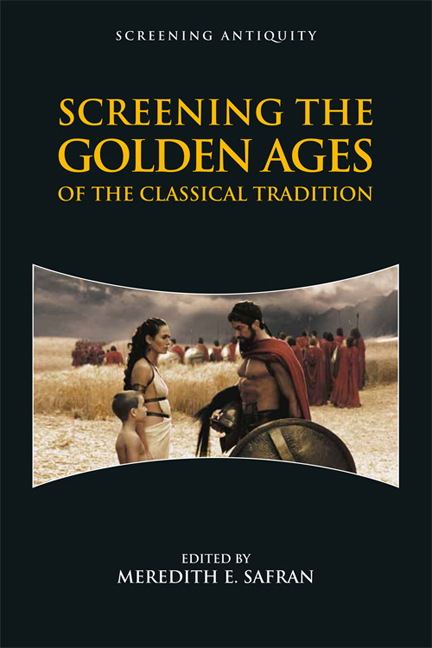Book contents
- Frontmatter
- Contents
- Series Editors’ Preface
- Editor's Acknowledgments
- Contributors
- Illustrations
- Abbreviations
- Introduction: Searching for Gold in an Age of Iron
- PART I THE GLORY THAT WAS GREECE
- PART II THE GRANDEUR THAT WAS ROME
- 8 “All That Glitters …”: Problematizing Golden-Age Narratives in Vergil's Aeneid and the Western Film Genre
- 9 The Golden Age and Imperial Dominance in the Aeneid and Serenity (2005)
- 10 Turning Gold into Lead: Sexual Pathology and the De-mythologizing of Augustus in HBO's Rome (2005–2007)
- 11 The Dux Femina Ends Westeros’ Golden Age: Cersei Lannister as Agrippina the Younger in HBO's Game of Thrones (2011–)
- 12 The Golden Aspects of Roman Imperialism in Film, 1914–2015
- 13 Broken Eagles: The Iron Age of Imperial Roman Warfare in Post-9/11 Film
- 14 Dreaming of Rome with Ridley Scott's Gladiator (2000)
- Filmography
- Bibliography
- Index
13 - Broken Eagles: The Iron Age of Imperial Roman Warfare in Post-9/11 Film
from PART II - THE GRANDEUR THAT WAS ROME
Published online by Cambridge University Press: 23 November 2019
- Frontmatter
- Contents
- Series Editors’ Preface
- Editor's Acknowledgments
- Contributors
- Illustrations
- Abbreviations
- Introduction: Searching for Gold in an Age of Iron
- PART I THE GLORY THAT WAS GREECE
- PART II THE GRANDEUR THAT WAS ROME
- 8 “All That Glitters …”: Problematizing Golden-Age Narratives in Vergil's Aeneid and the Western Film Genre
- 9 The Golden Age and Imperial Dominance in the Aeneid and Serenity (2005)
- 10 Turning Gold into Lead: Sexual Pathology and the De-mythologizing of Augustus in HBO's Rome (2005–2007)
- 11 The Dux Femina Ends Westeros’ Golden Age: Cersei Lannister as Agrippina the Younger in HBO's Game of Thrones (2011–)
- 12 The Golden Aspects of Roman Imperialism in Film, 1914–2015
- 13 Broken Eagles: The Iron Age of Imperial Roman Warfare in Post-9/11 Film
- 14 Dreaming of Rome with Ridley Scott's Gladiator (2000)
- Filmography
- Bibliography
- Index
Summary
A comparison of two very different battles serves to illustrate how the depiction of ancient warfare on film has changed during the decades separating the golden age of Classics on screen in the 1950s and 1960s from its post-2000 revival thanks to Ridley Scott's Gladiator. The first example is the climactic end to Stanley Kubrick's Spartacus (1960), in which two massed armies align themselves for the rhythmic dance of ancient warfare on the plains of Campania, where the historical Spartacus met his end in 71 bce. Jon Solomon captures the scene's ambience perfectly: “in all of filmdom there is no better exhibition of Roman military genius … the Roman cohorts and maniples, machinelike and crimson-cloaked, maneuver into perfectly straight phalanxes of icy death.” Juxtaposed with such calculating, faceless military might is the ragged but ardent slave army. In the end, their fervor for freedom cannot best the unflinching precision of Crassus’ legions.
In the second example, the ominous forests of the Scottish Highlands circa 117 ce set the moody stage for the second major battle scene of Neil Marshall's Centurion (2010). Amid the fog and rain, the camera catches furtive glimpses of native Picts spreading through their ancestral lands. Weapons in hand, they wait as the unsuspecting Roman column marches deeper into the shadows of the forest, tipped off by Etain (Olga Kurylenko), their mute spy planted among the Ninth Legion. A tree falls to block the legion's way; as the soldiers are forming themselves up, suddenly flaming bales roll at them from both sides, breaking apart the unprepared ranks. Brutal slaughter follows as the Picts attack, beheading the hated Romans as they advance steadily toward the general of the Ninth Legion, Titus Flavius Virilus (Dominic West). The scene ends with the protagonist, Quintus Dias (Michael Fassbender), hiding among the dead to save his own life as Virilus is carried off by the Pictish guerrillas. So much for the grandeur that was Rome.
The fundamental shift in contemporary perceptions and depictions of ancient warfare over these fifty years is a direct reflection of the changes in modern warfare that began with the Vietnam War and continued during the post-9/11 “War on Terror.”
- Type
- Chapter
- Information
- Screening the Golden Ages of the Classical Tradition , pp. 243 - 258Publisher: Edinburgh University PressPrint publication year: 2018



